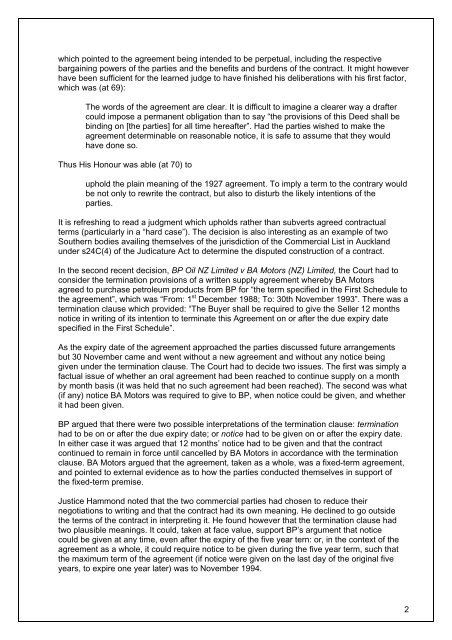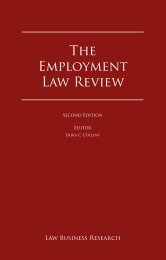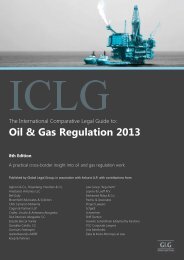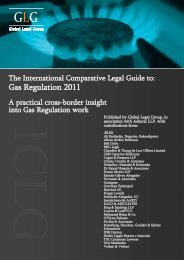CONTRACT LAW T Terminating a contract - Bell Gully
CONTRACT LAW T Terminating a contract - Bell Gully
CONTRACT LAW T Terminating a contract - Bell Gully
Create successful ePaper yourself
Turn your PDF publications into a flip-book with our unique Google optimized e-Paper software.
which pointed to the agreement being intended to be perpetual, including the respective<br />
bargaining powers of the parties and the benefits and burdens of the <strong>contract</strong>. It might however<br />
have been sufficient for the learned judge to have finished his deliberations with his first factor,<br />
which was (at 69):<br />
The words of the agreement are clear. It is difficult to imagine a clearer way a drafter<br />
could impose a permanent obligation than to say “the provisions of this Deed shall be<br />
binding on [the parties] for all time hereafter”. Had the parties wished to make the<br />
agreement determinable on reasonable notice, it is safe to assume that they would<br />
have done so.<br />
Thus His Honour was able (at 70) to<br />
uphold the plain meaning of the 1927 agreement. To imply a term to the contrary would<br />
be not only to rewrite the <strong>contract</strong>, but also to disturb the likely intentions of the<br />
parties.<br />
It is refreshing to read a judgment which upholds rather than subverts agreed <strong>contract</strong>ual<br />
terms (particularly in a “hard case”). The decision is also interesting as an example of two<br />
Southern bodies availing themselves of the jurisdiction of the Commercial List in Auckland<br />
under s24C(4) of the Judicature Act to determine the disputed construction of a <strong>contract</strong>.<br />
In the second recent decision, BP Oil NZ Limited v BA Motors (NZ) Limited, the Court had to<br />
consider the termination provisions of a written supply agreement whereby BA Motors<br />
agreed to purchase petroleum products from BP for “the term specified in the First Schedule to<br />
the agreement”, which was “From: 1 st December 1988; To: 30th November 1993”. There was a<br />
termination clause which provided: “The Buyer shall be required to give the Seller 12 months<br />
notice in writing of its intention to terminate this Agreement on or after the due expiry date<br />
specified in the First Schedule”.<br />
As the expiry date of the agreement approached the parties discussed future arrangements<br />
but 30 November came and went without a new agreement and without any notice being<br />
given under the termination clause. The Court had to decide two issues. The first was simply a<br />
factual issue of whether an oral agreement had been reached to continue supply on a month<br />
by month basis (it was held that no such agreement had been reached). The second was what<br />
(if any) notice BA Motors was required to give to BP, when notice could be given, and whether<br />
it had been given.<br />
BP argued that there were two possible interpretations of the termination clause: termination<br />
had to be on or after the due expiry date; or notice had to be given on or after the expiry date.<br />
In either case it was argued that 12 months’ notice had to be given and that the <strong>contract</strong><br />
continued to remain in force until cancelled by BA Motors in accordance with the termination<br />
clause. BA Motors argued that the agreement, taken as a whole, was a fixed-term agreement,<br />
and pointed to external evidence as to how the parties conducted themselves in support of<br />
the fixed-term premise.<br />
Justice Hammond noted that the two commercial parties had chosen to reduce their<br />
negotiations to writing and that the <strong>contract</strong> had its own meaning. He declined to go outside<br />
the terms of the <strong>contract</strong> in interpreting it. He found however that the termination clause had<br />
two plausible meanings. It could, taken at face value, support BP’s argument that notice<br />
could be given at any time, even after the expiry of the five year tern: or, in the context of the<br />
agreement as a whole, it could require notice to be given during the five year term, such that<br />
the maximum term of the agreement (if notice were given on the last day of the original five<br />
years, to expire one year later) was to November 1994.<br />
2








